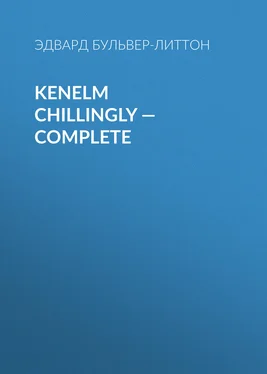Эдвард Бульвер-Литтон - Kenelm Chillingly — Complete
Здесь есть возможность читать онлайн «Эдвард Бульвер-Литтон - Kenelm Chillingly — Complete» — ознакомительный отрывок электронной книги совершенно бесплатно, а после прочтения отрывка купить полную версию. В некоторых случаях можно слушать аудио, скачать через торрент в формате fb2 и присутствует краткое содержание. Жанр: foreign_prose, literature_19, Европейская старинная литература, foreign_antique, на английском языке. Описание произведения, (предисловие) а так же отзывы посетителей доступны на портале библиотеки ЛибКат.
- Название:Kenelm Chillingly — Complete
- Автор:
- Жанр:
- Год:неизвестен
- ISBN:нет данных
- Рейтинг книги:3 / 5. Голосов: 1
-
Избранное:Добавить в избранное
- Отзывы:
-
Ваша оценка:
- 60
- 1
- 2
- 3
- 4
- 5
Kenelm Chillingly — Complete: краткое содержание, описание и аннотация
Предлагаем к чтению аннотацию, описание, краткое содержание или предисловие (зависит от того, что написал сам автор книги «Kenelm Chillingly — Complete»). Если вы не нашли необходимую информацию о книге — напишите в комментариях, мы постараемся отыскать её.
Kenelm Chillingly — Complete — читать онлайн ознакомительный отрывок
Ниже представлен текст книги, разбитый по страницам. Система сохранения места последней прочитанной страницы, позволяет с удобством читать онлайн бесплатно книгу «Kenelm Chillingly — Complete», без необходимости каждый раз заново искать на чём Вы остановились. Поставьте закладку, и сможете в любой момент перейти на страницу, на которой закончили чтение.
Интервал:
Закладка:
“Black Karl looked forth from his cottage door,
He looked on the forest green;
And down the path, with his dogs before,
Came the Ritter of Neirestein:
Singing, singing, lustily singing,
Down the path with his dogs before,
Came the Ritter of Neirestein.”
At a voice so English, attuned to a strain so Germanic, Kenelm pricked up attentive ears, and, turning his eye down the road, beheld, emerging from the shade of beeches that overhung the park pales, a figure that did not altogether harmonize with the idea of a Ritter of Neirestein. It was, nevertheless, a picturesque figure enough. The man was attired in a somewhat threadbare suit of Lincoln green, with a high-crowned Tyrolese hat; a knapsack was slung behind his shoulders, and he was attended by a white Pomeranian dog, evidently foot-sore, but doing his best to appear proficient in the chase by limping some yards in advance of his master, and sniffing into the hedges for rats and mice, and such small deer.
By the time the pedestrian had reached to the close of his refrain he had gained the fountain, and greeted it with an exclamation of pleasure. Slipping the knapsack from his shoulder, he filled the iron ladle attached to the basin. He then called the dog by the name of Max, and held the ladle for him to drink. Not till the animal had satisfied his thirst did the master assuage his own. Then, lifting his hat and bathing his temples and face, the pedestrian seated himself on the bench, and the dog nestled on the turf at his feet. After a little pause the wayfarer began again, though in a lower and slower tone, to chant his refrain, and proceeded, with abrupt snatches, to link the verse on to another stanza. It was evident that he was either endeavouring to remember or to invent, and it seemed rather like the latter and more laborious operation of mind.
“‘Why on foot, why on foot, Ritter Karl,’ quoth he,
‘And not on thy palfrey gray?’
Palfrey gray—hum—gray.
“‘The run of ill-luck was too strong for me,
‘And has galloped my steed away.’
That will do: good!”
“Good indeed! He is easily satisfied,” muttered Kenelm. “But such pedestrians don’t pass the road every day. Let us talk to him.” So saying he slipped quietly out of the window, descended the mound, and letting himself into the road by a screened wicket-gate, took his noiseless stand behind the wayfarer and beneath the bowery willow.
The man had now sunk into silence. Perhaps he had tired himself of rhymes; or perhaps the mechanism of verse-making had been replaced by that kind of sentiment, or that kind of revery, which is common to the temperaments of those who indulge in verse-making. But the loveliness of the scene before him had caught his eye, and fixed it into an intent gaze upon wooded landscapes stretching farther and farther to the range of hills on which the heaven seemed to rest.
“I should like to hear the rest of that German ballad,” said a voice, abruptly.
The wayfarer started, and, turning round, presented to Kenelm’s view a countenance in the ripest noon of manhood, with locks and beard of a deep rich auburn, bright blue eyes, and a wonderful nameless charm both of feature and expression, very cheerful, very frank, and not without a certain nobleness of character which seemed to exact respect.
“I beg your pardon for my interruption,” said Kenelm, lifting his hat: “but I overheard you reciting; and though I suppose your verses are a translation from the German, I don’t remember anything like them in such popular German poets as I happen to have read.”
“It is not a translation, sir,” replied the itinerant. “I was only trying to string together some ideas that came into my head this fine morning.”
“You are a poet, then?” said Kenelm, seating himself on the bench.
“I dare not say poet. I am a verse-maker.”
“Sir, I know there is a distinction. Many poets of the present day, considered very good, are uncommonly bad verse-makers. For my part, I could more readily imagine them to be good poets if they did not make verses at all. But can I not hear the rest of the ballad?”
“Alas! the rest of the ballad is not yet made. It is rather a long subject, and my flights are very brief.”
“That is much in their favour, and very unlike the poetry in fashion. You do not belong, I think, to this neighbourhood. Are you and your dog travelling far?”
“It is my holiday time, and I ramble on through the summer. I am travelling far, for I travel till September. Life amid summer fields is a very joyous thing.”
“Is it indeed?” said Kenelm, with much naivete . “I should have thought that long before September you would have got very much bored with the fields and the dog and yourself altogether. But, to be sure, you have the resource of verse-making, and that seems a very pleasant and absorbing occupation to those who practise it,—from our old friend Horace, kneading laboured Alcaics into honey in his summer rambles among the watered woodlands of Tibur, to Cardinal Richelieu, employing himself on French rhymes in the intervals between chopping off noblemen’s heads. It does not seem to signify much whether the verses be good or bad, so far as the pleasure of the verse-maker himself is concerned; for Richelieu was as much charmed with his occupation as Horace was, and his verses were certainly not Horatian.”
“Surely at your age, sir, and with your evident education—”
“Say culture; that’s the word in fashion nowadays.”
“Well, your evident culture, you must have made verses.”
“Latin verses, yes; and occasionally Greek. I was obliged to do so at school. It did not amuse me.”
“Try English.”
Kenelm shook his head. “Not I. Every cobbler should stick to his last.”
“Well, put aside the verse-making: don’t you find a sensible enjoyment in those solitary summer walks, when you have Nature all to yourself,—enjoyment in marking all the mobile evanescent changes in her face,—her laugh, her smile, her tears, her very frown!”
“Assuming that by Nature you mean a mechanical series of external phenomena, I object to your speaking of a machinery as if it were a person of the feminine gender,— her laugh, her smile, etc. As well talk of the laugh and smile of a steam-engine. But to descend to common-sense. I grant there is some pleasure in solitary rambles in fine weather and amid varying scenery. You say that it is a holiday excursion that you are enjoying. I presume, therefore, that you have some practical occupation which consumes the time that you do not devote to a holiday?”
“Yes; I am not altogether an idler. I work sometimes, though not so hard as I ought. ‘Life is earnest,’ as the poet says. But I and my dog are rested now, and as I have still a long walk before me I must wish you good-day.”
“I fear,” said Kenelm, with a grave and sweet politeness of tone and manner, which he could command at times, and which, in its difference from merely conventional urbanity, was not without fascination,—“I fear that I have offended you by a question that must have seemed to you inquisitive, perhaps impertinent; accept my excuse: it is very rarely that I meet any one who interests me; and you do.” As he spoke he offered his hand, which the wayfarer shook very cordially.
“I should be a churl indeed if your question could have given me offence. It is rather perhaps I who am guilty of impertinence, if I take advantage of my seniority in years and tender you a counsel. Do not despise Nature or regard her as a steam-engine; you will find in her a very agreeable and conversable friend if you will cultivate her intimacy. And I don’t know a better mode of doing so at your age, and with your strong limbs, than putting a knapsack on your shoulders and turning foot-traveller like myself.”
Читать дальшеИнтервал:
Закладка:
Похожие книги на «Kenelm Chillingly — Complete»
Представляем Вашему вниманию похожие книги на «Kenelm Chillingly — Complete» списком для выбора. Мы отобрали схожую по названию и смыслу литературу в надежде предоставить читателям больше вариантов отыскать новые, интересные, ещё непрочитанные произведения.
Обсуждение, отзывы о книге «Kenelm Chillingly — Complete» и просто собственные мнения читателей. Оставьте ваши комментарии, напишите, что Вы думаете о произведении, его смысле или главных героях. Укажите что конкретно понравилось, а что нет, и почему Вы так считаете.












